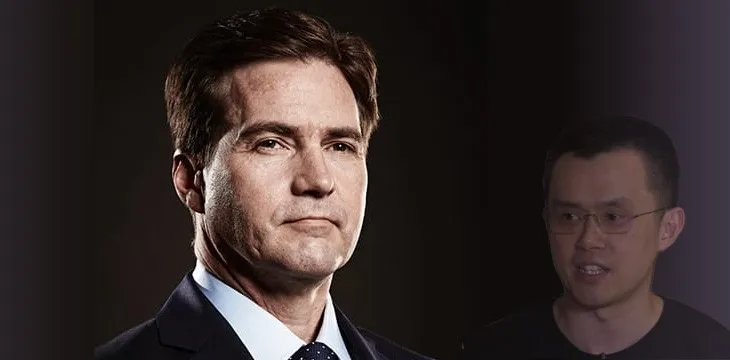|
Getting your Trinity Audio player ready...
|
Dr. Craig Wright has penned a stern warning to popular digital asset exchange Binance and its founder and CEO Changpeng Zhao. Accusing the exchange of being responsible for around US$2.1 billion in money laundering annually, he suggested governments would move to close it down.
At issue is Binance’s policy of not performing full Know Your Customer (KYC) procedures for accounts withdrawing up to 2 BTC in value over a 24-hour period. Since it requires only an email address and an (unverified) date of birth to create an account, anyone could create hundreds of accounts on the platform and move millions of dollars— “washing” it through various other assets before withdrawing.
In a post to his personal blog, Dr. Wright referred to Binance as a “money laundering service” and a “criminal shadow banking facility“.
He said he tested the platform himself and was able to create over 100 accounts, which would have enabled him to withdraw up to US$20,000 from each one. He compared it to the pre-Bitcoin exchange platform Liberty Reserve, which was investigated by 17 countries and shut down in 2013. Its operator, Arthur Budovsky, was charged with money laundering and sentenced to 20 years’ prison in May 2016.
United States prosecutors accused Liberty Reserve of laundering more than US$6 billion in criminal proceeds as part of the “Wild West of illicit internet banking”.
Though Binance certainly has many legitimate customers, Wright said, they are “innocent dupes” and “fools” who facilitate and help launder the profits of international criminal organizations.
Dr. Wright and Zhao (known popularly as “CZ”) have clashed several times in the past. CZ and Binance led a campaign to delist Bitcoin (BSV) from its platform and other exchanges, including Kraken and ShapeShift, in April 2019. CZ has regularly referred to Dr. Wright as a fraud, and Wright has accused Binance of facilitating criminal activities. Both are known to taunt each other on social media with threats of law enforcement action.
Reiterating points he has made in the past, Dr. Wright claimed the majority of Binance’s income “comes from the proceeds of credit card theft, identity fraud, laundering money associated with extortion, and Ponzi investment schemes”. The exchange’s liquidity and vast range of listed assets made it easy for criminals to move fiat currencies in and out of crypto-assets, and hide their tracks by trading amounts through various other tokens.
Binance has a problem with location
Dr. Wright’s warning comes as Binance attempts to explain what its branded operations in different jurisdictions actually do. Mainstream media reported in March 2018 that Binance would be relocating to EU member Malta after facing regulatory skepticism in Japan and Hong Kong. The “move”, coupled with the ability to handle fiat currencies, would give it access to the entire European market. However in late February 2020, Malta’s Financial Services Authority (MFSA) denied Binance had ever been authorized to operate there.
Exactly where Binance has its operational headquarters has never been clear. Though it has (branded) partner exchanges in several countries, the company is registered in Seychelles and the Cayman Islands. Its attempts to label the Malta office a “spiritual headquarters” seem incongruous with its 2018 announcement and media fanfare.
Dr. Wright claimed CZ himself “lives out of a suitcase” and “skips jurisdictions faster than some people change their socks” in an attempt to avoid “inevitable” law enforcement action. But Binance is less distributed in its operations than Liberty Reserve ever was, he wrote, and “want-to-be mastermind” CZ is clearly in charge.
Binance as a financial innovator and privacy champion, or crime facilitator?
Binance has long presented itself as a financial innovator, touting privacy as a right enabled by cryptocurrencies. It also runs a startup incubator and charity program supporting projects in developing countries, and claims to be compliant with local jurisdictions wherever it has physical operations. CZ has always been open about his role in founding and running the company, and is a public figure who frequently appears in the media and posts on social media.
However it also promotes its “decentralized exchange” (DEX) and privacy features as a key selling point, both for users and potential investors.
‘Decentralized dark pools’
https://twitter.com/cz_binance/status/1216560809708380160
Binance isn’t the only digital asset exchange that doesn’t require proper KYC procedures for “small volume” accounts. But it is probably one of the largest, and which lists the most assets. Success can also be a curse in the cryptocurrency world, if flouting the rules is your goal—those serving the most customers are first in line to receive regulators’ attention.
BTC-e, another formerly popular cryptocurrency exchange with no identification requirements and ambiguous operational locations, was shut down and had its domain (along with the contents of all accounts) seized by six US law enforcement agencies in July 2017. Users were offered half their money back without providing identification, or all of it if they completed a satisfactory KYC procedure. Even those who took the 50% option likely had their addresses flagged.
Given the past experiences of similar platforms where the main drawcards were “privacy” coupled with liquidity, it’s surprising that newer exchanges still think they can do it better. Sure, the financial rewards are huge, but it’s incredibly risky. Governments are infinitely better resourced than any trading platform. If an operation grows large enough for them to see it as a real threat rather than a niche-market subversion, they will crack down—and go to great lengths to do so.
Governments, especially those today, take the issue of money laundering and anonymous finance very seriously. Even smaller nation states that used privacy/anonymity as a key selling point (Switzerland being the prime example) have faced pressure in the past few decades to make their financial institutions more transparent.
The idea that cryptocurrency could skirt financial regulations with technology was a romantic notion for libertarians in the early days of Bitcoin. However it was also an unrealistic one. Bitcoin does seek to reduce the power of the corrupt and criminal, but its method is more transparency, not less. If the average consumer can obfuscate their financial dealings, the rich and powerful (along with the criminal and corrupt) can too. That’s not a world even the liberty-oriented should desire, as it would tip the scales even further against ordinary people.

 05-09-2025
05-09-2025 





